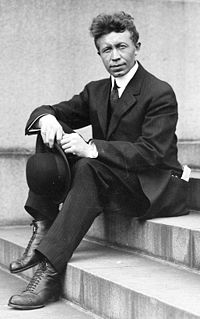A Quote by Andre Breton
Related Quotes
One might think this means that imaginary numbers are just a mathematical game having nothing to do with the real world. From the viewpoint of positivist philosophy, however, one cannot determine what is real. All one can do is find which mathematical models describe the universe we live in. It turns out that a mathematical model involving imaginary time predicts not only effects we have already observed but also effects we have not been able to measure yet nevertheless believe in for other reasons. So what is real and what is imaginary? Is the distinction just in our minds?
I would hate to be in high school now. Psychologists talk about the 'imaginary audience' that teens seem to feel they have around them and that makes them think they have to keep up their image all the time. Now with Facebook and MySpace and 24/7 online access, that imaginary audience has become real.
The poet Marianne Moore famously wrote of 'real toads in imaginary gardens,' and the labyrinth offers us the possibility of being real creatures in symbolic space...In such spaces as the labyrinth we cross over [between real and imaginary spaces]; we are really travelling, even if the destination is only symbolic.
Imaginary obstacles are insurmountable. Real ones aren't. But you can't tell the difference when you have no real information. Fear can create even more imaginary obstacles than ignorance can. That's why the smallest step away from speculation and into reality can be an amazing relief...The Reality Solution means: Do it before you're ready.
Art is not ideology. It is completely impossible to explain art on the basis of the homological relation that it is supposed to maintain with the real of history. The aesthetic process decentres the specular relation with which ideology perpetuates its closed infinity. The aesthetic effect is certainly imaginary; but this imaginary is not the reflection of the real, since it is the real of this reflection.







































